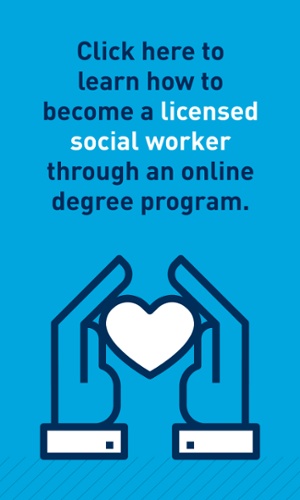
Social work is a rewarding profession in which you can help others through research-proven methods. It’s also a field that encourages continuous learning throughout your career. As new research emerges, you continuously refine your approach and ensure you provide the best support and care to each client you serve.
Learn more about what it means to let current research and best practices inform your social work services.
What Is Evidence-Based Practice in Social Work?
Evidence-based practice (EBP) is a methodology used in clinical occupations in which the care offered and decisions made are informed by current research in the field. In other words, it means taking the scientific evidence beyond the page and into real-life work with clients and patients.
As the National Association of Social Workers (NASW) points out in their definition of EBP, this process also factors in the worker’s own clinical experience and the specific context of the situation, such as client preferences and culture. All of these factors can help social workers implement effective interventions for their clients.
Why Is Evidence-Based Practice Important in Social Work?
One field in which evidence-based practice is essential is social work. Every day, social workers serve a variety of people experiencing difficulties such as poverty or mental health issues. These challenges call for real, evidence-based solutions that will help people enjoy a better quality of life.
Social workers often face challenging situations. When deciding how to help people most effectively, it’s best to rely on clinical data and research-supported best practices—not hunches or outdated principles. Ultimately, clients benefit when their social workers use EBP and may suffer when they don’t.
How Can Social Workers Implement Evidence-Based Practice?
Despite the importance of EBP in social work, research shows that most clients do not receive evidence-based care. Even with the best intentions, social workers can fail to offer the best possible care when they don’t embrace an evidence-based approach.
The key to changing this is ensuring social workers receive the proper training and commit to ongoing education. The field is also working on making evidence-based practices more clear, accessible, and standardized so that social workers are never in the dark about how best to serve their clients.
There are two main ways social workers can employ scientific evidence in their practice:
1. Follow well-documented procedures.
Although each person and situation is unique, some cases align with well-established social work practices. Think of these as the textbook scenarios you might encounter. In these situations, social workers draw on well-established research to form treatment plans and manage cases.
Of course, the efficacy of treatments can depend in part on the individual, so there may be some trial and error in finding the best plan for that specific person. The most effective way forward will often go beyond one practice; social workers commonly combine treatment modalities proven to be effective, such as psychotherapy and cognitive behavioral therapy, for maximum impact.
Because research is constantly evolving, evidence-based practice in social work also involves being open to learning new things and staying aware of current research so you can allow it to shape your practice. What was considered the gold standard a decade ago may no longer be the best method according to the latest research.
2. Apply research to unfamiliar scenarios.
Social workers must also be prepared to assess less familiar situations and make judgments about the best treatment plans and interventions to help those in their care. For example, there may be co-occurring problems to navigate or nuances in a client’s situation that make it more unusual. Social workers can determine the best way forward by examining the research and applying evidence-based practices to the current situation.
At times, this means filling in the gaps (because there will never be well-documented evidence for every possible scenario) and translating the existing research as faithfully as possible to a slightly different population or scenario than was documented in the research. As more research is conducted and published, there should be less uncharted territory for social workers to navigate.
Whether dealing with routine scenarios or more unique ones, evidence-based practice helps social workers deliver high-quality care.
Training the Next Generation of Social Workers in Evidence-Based Practice
One of the most effective means of implementing EBP is training and mentoring the next generation of social workers in this approach. Social workers need a solid foundation of knowledge to offer quality support to future clients. This starts with a robust social work degree program.
If you’re interested in becoming a social worker, choose an accredited program that will equip you with the knowledge and skills for EBP. The right social work degree program will help you learn the skills needed to provide the best possible care and foster a growth mindset so you never stop learning and refining your approach.
You can begin your career as a social worker who values evidence-based practice by enrolling in the Bachelor of Social Work (BSW) program at MVNU Online. This program is accredited by the Council on Social Work Education, so you can feel confident you’ll get an education that prepares you for success in this field.
In the BSW program, you’ll learn how textbook concepts and research studies apply in the real world. In fact, in addition to staying apprised of the most current research and best practices in social work, many professors are also actively working in the field. Likewise, on top of online coursework, students can put their learning into practice with an in-person field assignment.
Become an Evidence-Based Social Worker and Make a Real Difference in People’s Lives
What is evidence-based practice in social work? It’s not just a buzzword or a lofty ideal—it’s essential to delivering the best support possible to those who need it. No matter how positive your intentions are, helping people in practical ways that actually work can be a real challenge, but following research-backed methods is a powerful way of accomplishing that goal.
Do you want to make a real difference in people’s lives? Consider becoming a social worker through an online degree program. Learn about this degree program and career path in our e-book, Earning Your Accredited Online Social Work Degree!


